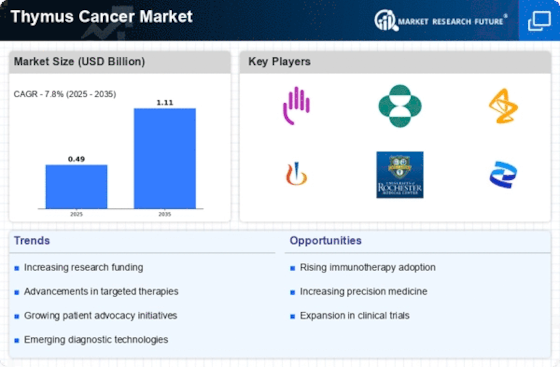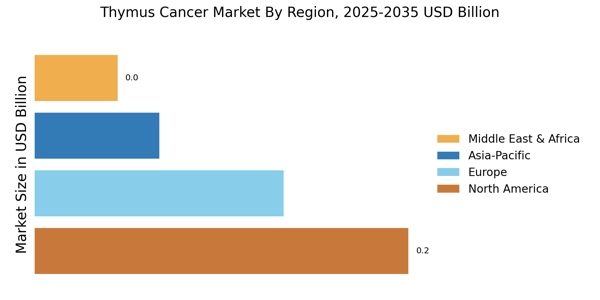Regulatory Support and Approvals
Regulatory support and streamlined approval processes are emerging as vital drivers for the Thymus Cancer Market. Recent changes in regulatory frameworks have facilitated faster approvals for new therapies, particularly those targeting rare cancers like thymus cancer. This supportive environment encourages pharmaceutical companies to invest in research and development, knowing that their innovations may reach the market more swiftly. Additionally, initiatives aimed at orphan drug designation for thymus cancer treatments could provide financial incentives for developers. As a result, the Thymus Cancer Market is likely to benefit from an influx of new therapies, enhancing treatment options available to patients.
Increased Awareness and Education
The growing awareness and education surrounding thymus cancer are crucial drivers for the Thymus Cancer Market. Initiatives aimed at educating both healthcare professionals and the general public about the symptoms and risks associated with thymus cancer are becoming more prevalent. This heightened awareness may lead to earlier diagnosis and treatment, which is essential for improving patient prognosis. Furthermore, organizations dedicated to cancer research and support are actively promoting awareness campaigns, which could result in increased funding for research and development. As more individuals recognize the importance of early detection, the demand for diagnostic tools and treatment options is likely to rise, thereby positively impacting the Thymus Cancer Market.
Growing Incidence of Thymus Cancer
The rising incidence of thymus cancer appears to be a pivotal driver for the Thymus Cancer Market. Recent data indicates that thymic tumors, although rare, have shown an increase in diagnosis rates, particularly among adults aged 40 to 60. This trend may be attributed to enhanced awareness and improved diagnostic techniques. As more cases are identified, the demand for effective treatment options is likely to escalate, thereby propelling market growth. Furthermore, the increasing prevalence of associated conditions, such as myasthenia gravis, may contribute to a higher number of thymus cancer diagnoses. Consequently, healthcare providers are compelled to invest in innovative therapies and treatment modalities, which could further stimulate the Thymus Cancer Market.
Advancements in Treatment Modalities
Innovations in treatment modalities for thymus cancer are likely to significantly influence the Thymus Cancer Market. The emergence of targeted therapies and immunotherapies has transformed the therapeutic landscape, offering new hope for patients. For instance, recent studies suggest that the integration of checkpoint inhibitors may enhance treatment efficacy, leading to improved patient outcomes. Additionally, the development of personalized medicine approaches, which tailor treatments based on individual genetic profiles, could further refine therapeutic strategies. As these advancements gain traction, they are expected to attract investment and research efforts, thereby fostering growth within the Thymus Cancer Market. The potential for combination therapies also indicates a promising future for treatment options.
Research and Development Investments
The surge in research and development investments is poised to drive the Thymus Cancer Market forward. Funding from both public and private sectors has been directed towards understanding thymus cancer biology and developing novel therapeutic approaches. Recent reports indicate that increased financial support for clinical trials and research initiatives is fostering innovation in treatment options. This influx of capital is likely to accelerate the pace of discovery, leading to the introduction of new drugs and therapies tailored for thymus cancer patients. As the landscape of treatment evolves, the Thymus Cancer Market may experience significant growth, driven by the continuous quest for effective solutions.

















